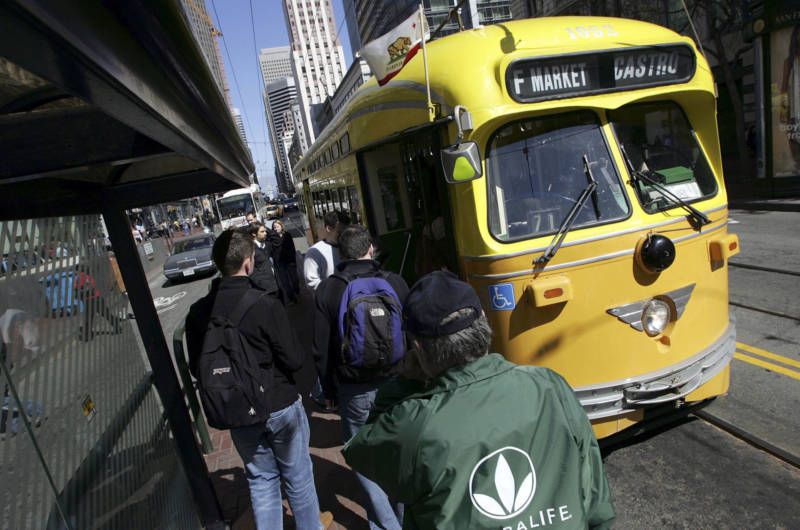Most of the 16 episodes that CPUC inspectors documented involved on-duty operators and other employees who failed to turn their cellphones off or stow them as directed by Muni's own "zero tolerance" rules.
Those rules require train operators to switch off their devices and "secure them in a location out of sight and off person ... and away from the employee" -- usually in a special locker aboard the transit vehicle. Penalties for violating the rule range from counseling in cases where operators have failed to properly store phones to suspension or firing for use of phones while operating a vehicle.
The CPUC citation says inspectors documented case after case in which streetcar drivers, light-rail operators and cable-car crew members carried switched-on phones in their pockets or put them in backpacks shoved under their seats while they worked.
In one incident, a CPUC inspector observed a Muni streetcar operator use his cellphone as he got off his vehicle near Fisherman’s Wharf, then put the phone in his pocket as he helped passengers board.
“A few moments later, the inspector showed the train operator his identification, announced who he was, and asked to see the train operator’s cellphone," the CPUC citation says. "The train operator stated that he did not have one. When confronted with the inspector’s statement that he had seen the cellphone, the train operator said it was in his bag. ... When asked to produce the phone from his bag, the train operator refused to do so even when told his supervisor would be notified."
In another case, the CPUC said a train operator who had failed to turn off his phone or stow it before beginning a run on the Muni Metro refused to produce the device when an inspector asked him to. The operator insisted that a Muni supervisor had instructed employees "not to produce their cellphones when confronted by CPUC inspectors."
Two other incidents involved workers -- a train operator and a private security guard working for Muni -- talking on their phones as they walked across tracks in rail yards.
The CPUC citation added that when its Safety Enforcement Division approached a senior Muni official last June to ask about how many cellphone violations the transit agency had recorded so far in 2018, the official "replied that no violations" had been discovered.
In a letter to the CPUC last week, Municipal Transportation Agency chief Ed Reiskin said Muni accepts the inspectors' findings and is "moving decisively" to curb cellphone violations. Among the steps the agency is taking, Reiskin said, are "targeted blitzes" to remind operators about the rules on personal electronic devices, new signage on vehicles and in rail facilities, and a new test for operators on the requirements of state and local regulations.
"This is an issue we take very seriously," SFMTA spokesman Paul Rose said in an emailed statement Thursday. "Even though no one was using their cell phone while driving, we took a number of steps in response to these violations. ... Managers worked hard to reach out to operators to get feedback and share the importance about following these rules."
